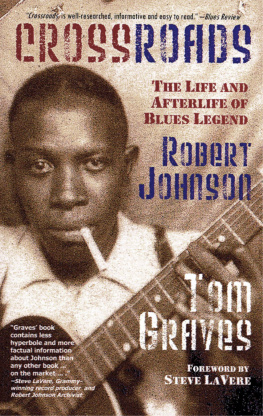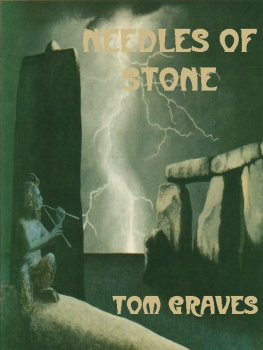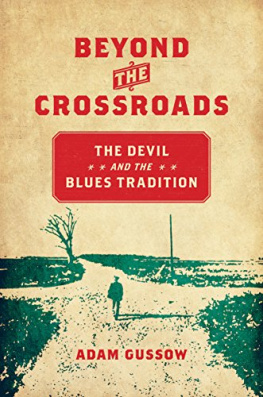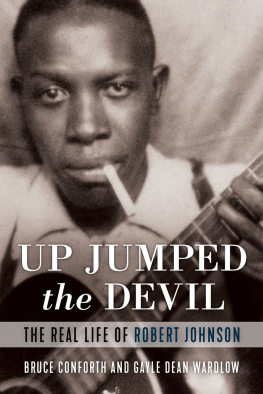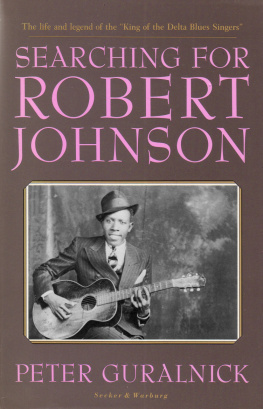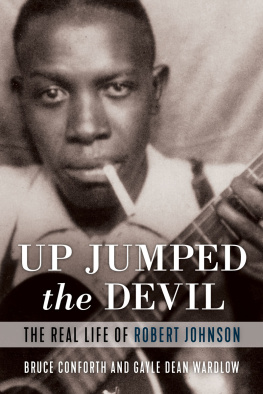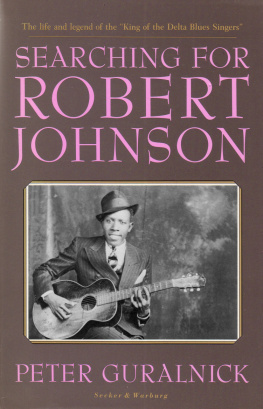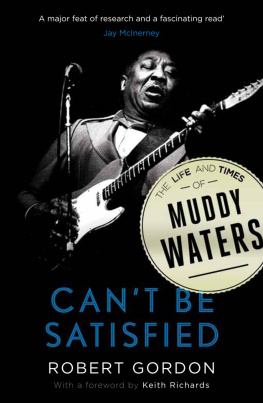Copyright 2008 Demers Books LLC
All rights reserved. No part of this publication may be reproduced, stored in a retrieval system, or transmitted in any form or by any means, electronic, mechanical, photocopying, microfilming, recording, or otherwise, without permission of the publisher.
PRINTED IN THE UNITED STATES OF AMERICA
Except where noted, all photographs and illustrations in this book are in the public domain and were obtained from the digital collections housed online at the Library of Congress.
CATALOG-IN-PUBLICATION-DATA
Graves, Tom 1954-
Crossroads: the life and afterlife of blues legend Robert Johnson / Tom Graves: foreword by Steve LaVere.
p. cm.
Includes bibliographical references (p.) and index .
ISBN 978-0-9816002-1-5 (pbk. : alk. paper) --
1. Johnson, Robert, d. 1938. 2. Blues musicians-Mississippi-Biography.
1. Title.
2008925674
Edited by Darcy K. Creviston
DEMERS BOOKS LLC
5915 S. Regal St., Suite 118B
Spokane, Washington 99223
509-443-7057 (voice) / 509-448-2191 (fax)
books@demersbooks.com / www.DemersBooks.com
For Allison, Bintou, and Mom
F oreword
S traight T alk
By Steve LaVere
T om Graves Crossroads is perhaps the most accurate recital of facts concerning Robert Johnsons life and death that youre likely to come across for many years to come. A large portion of this volume also deals very clearly and objectively with Johnsons phenomenal afterlife, in which his place in the pantheon of major artists of the 20th century has grown from being acknowledged initially as The King of the Delta Blues Singers (itself a remarkable attribution for one whose initial output was a mere dozen 78 rpm recordings) to being one of a few watershed artists in the entire history of music. Mr. Graves covers it all, from Johnsons initial appearance on long play records a time when very little was known about him through his life, including the discovery of the few photographs of him, the resurgence of interest in him after those discoveries, and the search for the rightful heir to the small fortune that had amassed from the royalties collected from the use of Johnsons songs.
Graves book contains less hyperbole and more factual information about Johnson than any other book on the market. Nearly every major article or book previously published about Johnson contains major flaws either the research was faulty and unsubstantiated or it was rife with false ideas, romantic exaggeration or myths that were treated as fact. Graves book carefully separates fact from fiction, dealing with the romanticism, exaggeration and myth without disguise. In addition, he presents, for the first time, the truth concerning Johnsons poisoning, his death-bed conversion, the cause of his death and the location of his burial. Theres also a decisive exploration of the snippet of silent motion picture footage that was initially touted as being Johnson but was subsequently proved not to be him.
However, this book does not so much destroy the myths about Johnson as it removes the myths from the realm of possibility, then deals with them for what they are. Despite some peoples lamentations that myths give people hope and make life more interesting, Johnsons music itself is enough to create its own world of hope, one where all of us especially blues fans can appreciate musicians who make us think of the world and other people in a whole new way. In addition, one could point out, as Graves does, that even the destruction of myth doesnt signal the destruction of culture or an appreciation of the people who actively create culture.
There is, indeed, a great deal of interesting reading here. But it wasnt always that way. By the time Frank Driggs intriguing liner notes to the first reissue album of Robert Johnsons classic blues recordings, King of the Delta Blues Singers, eventually fired my imagination and motivated me to look into what real information there might be extant about the albums subject, I had already gleaned what little there was from the unsubstantiated accounts in inaccurate books by would-be researchers and short bits and articles in specialty magazines by well-intentioned fans.
The liner notes, however, provided some good clues, so I began my search for Johnson where Johnson himself began, in Robinsonville, Miss. I got lucky and within a few weeks I was learning about the entire life and death of Robert Johnson from one of the best sources of a mans history: his sister, Carrie Thompson, who was closest to him throughout his early life. She took me into her confidence and disclosed a great deal of information not only about her precious Little Robert but every other member of her large, extended family as well. I wrote down everything she told me and later verified and documented everything I could from various census and civic records. I then re-foliated Robert Johnsons family tree back to the early 19th century. The exercise not only fleshed out Johnson as a man, including his background and life and death, it also brought into sharp focus my own concern for facts a concern that is also shared by Tom Graves.
P reface
F act, M yth
and the M usician
F ifty years ago fewer than 100 people in the world knew anything of substance about the life of bluesman Robert Johnson. He died penniless and virtually unknown outside the Mississippi Delta. On the strength of twelve 78 rpm records he cut for American Record Corporation in 1936 and for Vocalion record label in 1936 and 1937, a legend began to percolate among an elite group of music folklorists and scholars who had begun to take race music the music of African-Americans seriously.
Robert Johnsons music first reached a wider audience in 1938, when legendary record producer John H. Hammond held a historic concert at Carnegie Hall in New York. The concert was called From Spirituals to Swing, and introduced to the haut monde of New York the best and most varied of African-American musicians, composers and singers. Robert Johnson was listed on the concert bill, but he had died in August. On stage that night, John Hammond inaccurately told his audience, Johnson died last week at the precise moment he was booked to appear at Carnegie Hall on December 23. He then played two of Robert Johnsons songs on a phonograph that was miked through the public address system.
Even after this landmark introduction to a world audience, almost no one knew anything of the life of the man himself. In later years, as Johnsons popularity grew, an army of blues researchers combed the Mississippi Delta for clues that would shed light on the real man. Most found the search maddening, because so little information could be found. Johnson remains one of the most elusive and mysterious figures ever accorded the status of a biography. Separating fact from fiction, legend from truth, accuracy from exaggeration is a Sisyphean task. Just when one fact seems verified, it is contradicted by other facts, other research.
Three biographical works on Robert Johnson, each with a unique and valuable perspective, were the cornerstones of wisdom and information for this book and were consulted frequently. They were Searching for Robert Johnson by Peter Guralnick, Robert Johnson: Lost and Found, by Barry Lee Pearson and Bill McCullough, and Escaping the Delta, by Elijah Wald. Also indispensable were the liner notes to the CD box set Robert Johnson: The Complete Recordings, written by Steve LaVere, who also wrote the foreword to this book. Robert Gordons article, The Plundering of Robert Johnson, was a valuable resource for the chapter on the discovery of Robert Johnson photographs. Anyone interested in delving deeper into the world of Robert Johnson should seek these texts. In addition, many other sources, including three documentary films, were used as references in the preparation of this book. They are listed in the bibliography.
Next page
